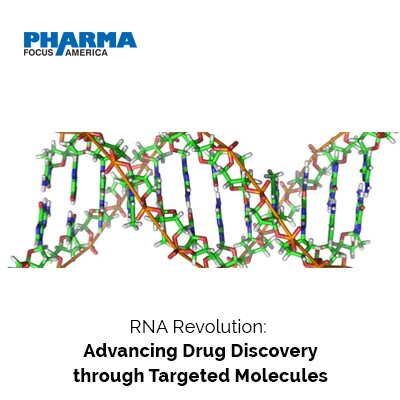
The RNA revolution in drug discovery has introduced targeted molecules like ASOs, siRNA, and RNA vaccines, offering precise gene modulation and therapeutic versatility across genetic disorders, neurodegenerative diseases, infectious diseases, and cancer. Challenges include delivery efficiency and immunogenicity, driving research toward innovative solutions for future healthcare advancements.

In the realm of drug discovery, the landscape is constantly evolving, driven by innovative technologies and scientific breakthroughs. One such revolution that has significantly impacted drug discovery is the emergence of RNA-targeted molecules. These molecules hold tremendous potential in treating a wide range of diseases, from genetic disorders to infectious diseases and cancer. This article delves into the RNA revolution, exploring how targeted molecules are shaping the future of drug development.
RNA, or ribonucleic acid, is a fundamental molecule found in all living cells. Its primary role is to carry genetic information from DNA to proteins, playing a crucial role in gene expression and regulation. While DNA has traditionally been the focus of drug development due to its central role in genetics, RNA has garnered increasing attention for its therapeutic potential.
One of the key advantages of targeting RNA lies in its ability to modulate gene expression directly. Unlike traditional small-molecule drugs that target proteins, RNA-targeted molecules can intervene at the genetic level, offering precise control over gene expression. This opens up new possibilities for treating diseases that were once considered challenging to address with conventional therapies.
The RNA revolution encompasses various types of molecules designed to target different aspects of RNA function. Some of the key categories include:
Antisense Oligonucleotides (ASOs):ASOs are short synthetic strands of nucleic acids that can bind to specific RNA sequences, thereby modulating gene expression. They can target both messenger RNA (mRNA) to regulate protein production and non-coding RNAs involved in gene regulation.
Small Interfering RNA (siRNA):siRNA molecules work by triggering the degradation of specific mRNA molecules, effectively silencing the expression of target genes. They offer a potent approach to downregulating disease-causing genes and have shown promise in treating various genetic disorders.
RNA-Targeting Small Molecules:Unlike nucleic acid-based approaches, RNA-targeting small molecules are organic compounds designed to bind to RNA structures or proteins involved in RNA processing. These molecules can modulate RNA function and are being explored for their therapeutic potential in diseases such as viral infections and cancer.
RNA Vaccines:RNA-based vaccines, such as messenger RNA (mRNA) vaccines, have gained widespread attention due to their rapid development and effectiveness in generating immune responses. These vaccines utilize RNA molecules encoding viral or disease-specific antigens to stimulate immune protection.
The adoption of RNA-targeted molecules in drug discovery offers several distinct advantages:
Precision Targeting:RNA-targeted molecules allow for precise targeting of disease-causing genes or RNA structures, minimizing off-target effects and improving therapeutic outcomes.
Modular Design:The modular nature of RNA-targeted molecules enables flexibility in designing therapeutics for different diseases and genetic targets.
Therapeutic Versatility:RNA-targeted approaches can be applied across a broad spectrum of diseases, including rare genetic disorders, neurodegenerative diseases, infectious diseases, and cancer.
Gene Editing Potential:Advanced RNA technologies, such as CRISPR-Cas systems, offer the potential for precise gene editing, opening up new avenues for therapeutic interventions.
The application of RNA-targeted molecules spans across various disease areas, showcasing their versatility and potential impact on healthcare:
Genetic Disorders:ASOs and siRNAs hold promise in treating genetic disorders by targeting specific gene mutations responsible for diseases like Duchenne muscular dystrophy, Huntington's disease, and cystic fibrosis.
Neurodegenerative Diseases:RNA-targeted therapies are being explored for neurodegenerative conditions such as Alzheimer's disease, Parkinson's disease, and amyotrophic lateral sclerosis (ALS), aiming to modulate disease progression and improve patient outcomes.
Infectious Diseases:RNA-based therapeutics, including RNA vaccines and antiviral ASOs, have demonstrated effectiveness against viral infections such as COVID-19, influenza, and hepatitis.
Cancer:RNA-targeted molecules play a role in cancer treatment by targeting oncogenes, inhibiting tumor growth, and enhancing the efficacy of chemotherapy and immunotherapy regimens.
While RNA-targeted molecules offer immense potential, several challenges remain to be addressed:
Delivery Challenges:Efficient delivery of RNA-targeted molecules to target cells and tissues remains a major hurdle, requiring advancements in delivery systems and nanotechnology.
Off-Target Effects:Ensuring specificity and minimizing off-target effects are critical for the safety and efficacy of RNA-based therapies.
Immunogenicity:Some RNA molecules may trigger immune responses, necessitating strategies to mitigate immunogenicity and enhance therapeutic tolerability.
Cost and Scalability:Developing RNA-based therapeutics can be costly, requiring investments in research, development, and manufacturing processes.
Looking ahead, ongoing research efforts are focused on overcoming these challenges and unlocking the full potential of RNA-targeted molecules in drug discovery. Advances in delivery technologies, bioinformatics, and RNA engineering are expected to drive innovation and broaden the therapeutic applications of RNA-based therapies.
The RNA revolution represents a paradigm shift in drug discovery, offering a powerful toolkit for precision medicine and therapeutic interventions across a wide range of diseases. From targeting specific genetic mutations to modulating gene expression and harnessing immune responses, RNA-targeted molecules hold immense promise in shaping the future of healthcare. As research continues to unravel the complexities of RNA biology and therapeutic applications, we stand at the forefront of a transformative era in medicine, propelled by the innovative potential of targeted RNA-based therapies.